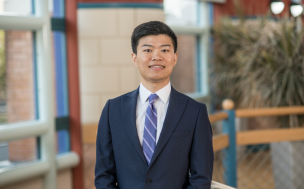One of her memories from childhood is scribbling away on her bus journey home from school, quickly flying through essays the day they were set. It was training that would lead her to a bachelor’s in journalism from NYU and a role as the managing editor and director of Shanghaiist, one of the world’s most popular English language news blogs about China.
She now heads-up brand strategy for RADII in Shanghai, a media startup that shines a light on Chinese youth culture and tells the stories of China’s emerging creatives to the rest of the world.
It’s a career that’s the culmination of a diverse upbringing, hard journalism experience, and an MBA from The University of Cambridge’s Judge Business School in 2012.
Why MBA: Cambridge Judge Business School
After being hired by Shanghaiist to write, Elaine soon found herself leading much more. It was then that she began looking for MBA programs.
“I was dumped into running a business and I got a touch of knowing what I didn’t know,” she recalls.
“When I started to take over management of the business, I awoke to the idea that I kind of like making these decisions, setting up a structure for something to succeed. I wanted to do more of that in my life.”
Elaine says an MBA gave her a generalist understanding of business that’s applicable in any role, and when she found the Cambridge MBA program it was what she was after: A one-year, practical MBA with a diverse, professionally strong cohort.
The Cambridge MBA class of 2020 had an average age of 29, with six years’ work experience. 38 nationalities were represented, and students came from educational backgrounds in the arts, business and finance, social and political sciences, and science, technology, engineering, and math (STEM).
Practical learning on the Cambridge MBA
Elaine was worried coming into the MBA with a non-business background. But in her cohort, as well as the more traditional MBA backgrounds, there were also architects, the lead ballet dancer of the Rotterdam Ballet, poets, and other journalists. There was a strong peer-to-peer learning element too, with students sharing their expertise with others in class with different backgrounds.
The Cambridge MBA puts a strong emphasis on providing students with practical learning through MBA consulting projects. The Global Consulting Project (GCP) sees students work in consulting teams for a major international company anywhere in the world.
Students can tailor their consulting projects to match their areas of focus. The MBA has 10 career concentrations, from culture, arts and media management and digital transformation, to entrepreneurship, health strategies, and social innovation.
Elaine completed an MBA internship with marketing and advertising firm, Ogilvy.
“That gave me a very good base knowledge to take on a higher executive role later in my career,” she says. “The great thing about Ogilvy was that it was the first time I’d ever worked in an advertising firm, and it was good to get the experience before entering the industry in more solid way.”
After the MBA, Elaine returned to China and after a marketing communications role with Architect@Work China she worked for five years for Publicis.Sapient—part of Publicis Groupe, one of the big four advertising agencies. It was when she left that role to join RADII as director of brand strategy that she saw the real benefits of the entrepreneurial driven approach to the Cambridge MBA.
“I had a lot of classes on organizational behavior, how to set up systems for a company to be successful, and how to strategize,” she recalls.
“I think being able to go through that in the MBA was very useful for when I first joined Publicis, and then into this much more ‘startup-y’ atmosphere.”
The value of an International MBA in China
RADII was founded by the VP of Alibaba and other international investors interested in dispelling notions of Chinese creativity in the world. Elaine explains that the publication’s goal is to dispel the myth that nobody in China can create.
The publication aims to take China’s emerging creatives—from artists and musicians, to writers and influencers—and showcase them to countries outside of China.
Elaine has seen the first-hand benefit of returning to China with the knowledge and network she developed while studying for an International MBA at Cambridge.
“There’s a definite benefit of having an international perspective,” she asserts, “one that is helpful for China as it moves forward in the world.”
Elaine needs a strong foot in the international world to drive brand strategy for RADII. China’s economy, despite growing stronger internally, also wants to face outwards, Elaine explains. It’s useful for her to know what’s going on outside of China, and to continue to educate herself on the different strategies and approaches to business development happening in industries other than her own.
That’s where the value of the Cambridge MBA network comes in.
“Up until we stopped travelling because of COVID I was able to meet up with several Cambridge alumni at least once or twice a year,” she says. “The ability to ask them questions about whatever market they’re in has stayed there for the last eight years.”
An MBA peer of Elaine’s who works for a consultancy recently shared research with her on revenue generation models in the media—a project Elaine is currently working on.
“He shared it with me, went through it all, and that’s definitely going to be informing how I take my company forward.”
As China continues to grow, Elaine shows the value an International MBA has when launching a career in Asia. With Chinese companies going global and western companies looking to move East, an MBA that bridges that gap becomes a tool for quick career progression.








